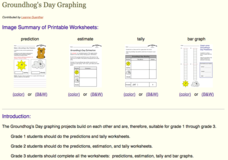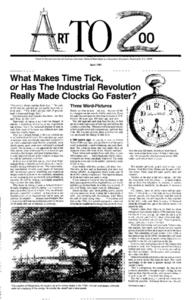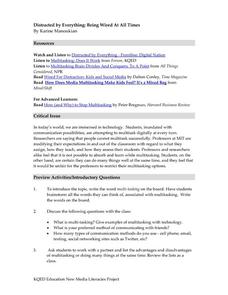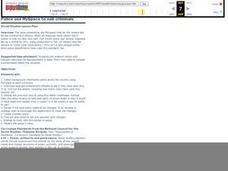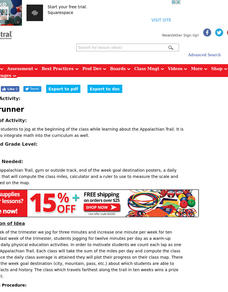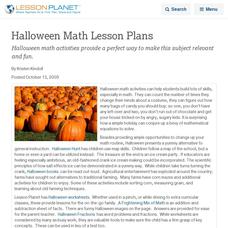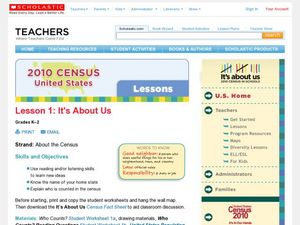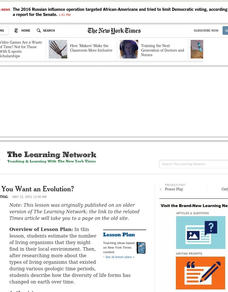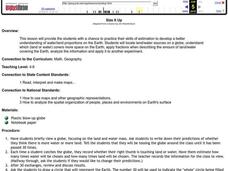Curated OER
Get Ready, Get Set, Squeeze!
Students explore coin value and count coin combinations. In this money counting and social studies lesson, students read The Coin Counting Book by Rozanne Lanczak Williams and practice counting money and making change for a lemonade...
Kid Zone
Groundhog's Day Graphing
This Groundhog's Day, challenge scholars to predict, estimate, tally, and graph in a weather-themed lesson in which class members play the role of the groundhog to forecast the weather come February second.
Curated OER
Validating Votes
Explore the discrepancies in Florida's vote counting process in 2000 and 2002 with this New York Times reading lesson plan. Middle schoolers study the viewpoints presented in informational text, paying attention to how word choice...
Curated OER
Stamps are Making News
Students analyze the cost of mailing a letter since 1917, then read a news article about the increasing stamp price and new Star Wars stamps that will be available. For this current events lesson, the teacher introduces the article with...
Curated OER
Money Talks Canadian Money
Learners use newspapers, games and journal writing activities to examine the importance of money and the role it plays in daily life. They complete several math problems, fill out worksheets and practice changing varying amounts.
Curated OER
What Makes Time Tick, or Has the Industrial Revolution Really Made Clocks Go Faster?
Students explore the concept of time both historically and in their own lives. Students count the number of times they refer to a clock and the number of scheduled and unscheduled activities in their lives. Students discuss how the...
NPR
Distracted by Everything - Being Wired at All Times
This multimedia activity challenges media-savvy learners to look at the critical issue concerning the inundation of technology and multitasking in the classroom, and its effects on the education of themselves and others. The tasks...
Curated OER
Recycling and Composting
Students set up composting sites that allow food scraps and paper to be recycled by nature. They are introduced to one aspect of recycling; composting. Students see how God recycles as the worms change garbage into something that brings...
Curated OER
Paper Production
Students compare paper making by hand and by assembly line. In this manufacturing lesson, students compare and contrast the two main ways to make paper, by hand or by machine. Students research paper making and have a class...
Curated OER
Disposables and Deforestation
Ever think about the impact those cool disposable chopsticks have on the environment? Read about a group of students in Beijing who created a forest using nothing but tossed out chopsticks. Find out how this artistic endeavor is making a...
Curated OER
Social Studies: MySpace as Crime solver
Students research how police use MySpace to apprehend criminals. They debate the pros and cons of this method and decide if the local policy needs to be changed. Students create a better policy for using the Internet and present it to...
Curated OER
Ridgerunner
Students jog for three minutes at the beginning of the class, increasing one minute per week for ten weeks. They count each lap as one mile on the Appalachian Trail, computing the class average and plotting their progress on a class map.
Curated OER
Government
Second graders run for various offices. They dress up like a politician, pretend to be running for an office, and tell the students why they should vote for him/her. They explain why it is necessary for a community to have a government
Curated OER
Halloween Math Lesson Plans
Halloween math activities provide a perfect way to make this subject relevant and fun.
Curated OER
Xmas Traditions Bluff
In this holiday worksheet, students, working in teams, try to bluff the other team in making statements associated to traditional Christmas traditions that could not possibly be true. Students complete a grammar assignment at the end of...
Curated OER
2010 Census Lesson 1: It's About Us
Students analyze data from the 2000 census to learn how the census works. In this civics lesson, students read a story to find out about the census, then use a map and census data to analyze changes. Lesson includes related resources...
Curated OER
You Say You Want an Evolution?
Young scholars estimate the number of living organisms they might find in their local environment. After researching the types of organisms that existed during various geologic time periods, students describe how life forms have changed...
Curated OER
World in the Balance
Young scholars make estimates on how many people they believe live on Earth. While watching a video, they take notes on the issues facing Kenya, Japan and India. In groups, they calculate how long it takes for a country to double in...
Curated OER
Privacy in the Age of Video Surveillance: This Is Not Your Father's Candid Camera
Eighth graders examine the use of video surveillance in the corporate world and other life situations. In groups, they determine how many times and in what situations they believe they are being watched. They use the Constitution to...
Curated OER
Lesson 12- Quincy Jones:What Makes an American Master?
Students study the life of Quincy Jones and research black music for selected decades of the 20th Century. They discuss the qualities that help one create and sustain a successful career. They design a timeline of what their future...
Curated OER
Size It Up
Students practice their math skills in determining the water/land proportions of the Earth. Using globes, they locate the seven continents and oceans and determine which covers more space. They use this information to participate in...
Curated OER
Pop Clock
Students review the Census Bureau's Homepage, gather information regarding population trends in order to make predictions on future populations.
Curated OER
Math -- Money
Students identify a penny, nickel, dime, quarter and a half dollar. They examine the value of each coin and its equivalents (to quarter/dollar). After pairing up with a classmate, each one drills the other one on each coin.
Curated OER
Urban Planning: Plan a City
Students analyze the concept of urbanization by planning the placement of some of the major urban/suburban features that make up most cities. They arrange the cultural features to benefit the people who live there, and maintain respect...

